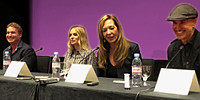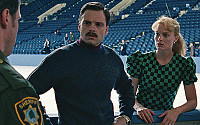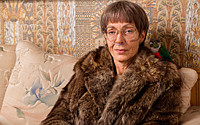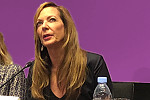| SHADOWS ON THE WALL | REVIEWS | NEWS | FESTIVAL | AWARDS | Q&A | ABOUT | TALKBACK | ||
 Liberated by the look
Liberated by the lookChatting about I, Tonya with Margot Robbie, Allison Janney, Steven Rogers and Craig Gillespie... | ||
 Chatting about Tonya: Steven Rogers, Margot Robbie, Allison Janney and Craig Gillespie in London  Above: Robbie as Harding with Sebastian Stan as Gillooly. Below: Janney as Lavona.  
|
B Y R I C H C L I N E | |
 The award-winning biopic I, Tonya chronicles the notorious life of figure skater Tonya Harding, who is best known for the attack on her skating rival Nancy Kerrigan just before the 1994 Winter Olympics. The film recognises the messiness of the real story by portraying conflicting perspectives in ways that are often blackly hilarious, so it's sparking conversations about some very big issues.
The award-winning biopic I, Tonya chronicles the notorious life of figure skater Tonya Harding, who is best known for the attack on her skating rival Nancy Kerrigan just before the 1994 Winter Olympics. The film recognises the messiness of the real story by portraying conflicting perspectives in ways that are often blackly hilarious, so it's sparking conversations about some very big issues.
For your first project as a producer, you've chosen something that's almost eerily timely. Why did you want to tell Tonya's story? Craig Gillespie: I'd never read a script like this. It was so original in its structure and in the extremes of comedy and drama, empathy and violence. And I loved that challenge! And I was lucky enough that Margot and Allison were already attached, which made my life very easy.
The characters feel quite extreme, but also realistic. Allison Janney: I had to ground her in reality, just flesh her out so she wasn't just a monster. I didn't get to speak with the real woman, but I approached her as any other role as an actress. You have to make it make sense to you and make her choices make sense to you. Why would she behave like this? Why would she do this or that? Which was really fun to do. And the humour comes out of the juxtaposition, those different viewpoints mashed up next to each other. It's just shocking to see Lavona throw a knife at Tonya and you cut to her saying, "What family doesn't have their ups and downs?" Just minimalising this unbelievable, terrifying abuse. Robbie: It's a weird thing playing a real-life person who's alive and going to see the film! Because I knew I was going to be intimidated by that prospect, I kept the character of Tonya and the real-life Tonya very separate in my mind for as long as I possibly could. And for that reason, I didn't meet the real Tonya in person until right before we started shooting. I needed that to feel like I could let this character do her own thing on-set, not hold back. Otherwise I think I would be trying to gloss over character flaws and trying to enhance the good things. I wouldn't have been able to be as authentic. How much did the costumes and makeup help?
How did Tonya feel about putting her story on the big screen? Gillespie: Margot and I got to meet Tonya two weeks before we started shooting, and I was amazed by how trusting she was with what was going on, because it's been 25 years of living under this label of being this villain. I felt comfortable looking her in the eye and telling her that we were really trying to portray her version of it. There would also be Jeff's version, but I thought we could honour that, and in doing that we could make a much more complex story. Robbie: I think it's a complicated thing to sum up how she feels about the film. I imagine if we put ourselves in her shoes, to see the best and worst parts of your life depicted on-screen by other people, it would be a bizarre experience. She said she laughed and she cried, and she didn't agree with the parts told from Jeff's point of view, which we were expecting. But overall I think that she is pleased that a more nuanced version of her story is now out there in the world. You've stepped into the producer role, are you thinking about directing? SOHO HOTEL, LONDON • 16.FEB.18
| ||
© 2018 by Rich Cline, Shadows on the Wall HOME | REVIEWS | AWARDS | NEWS | FESTIVAL | Q&A | ABOUT | TALKBACK | ||

